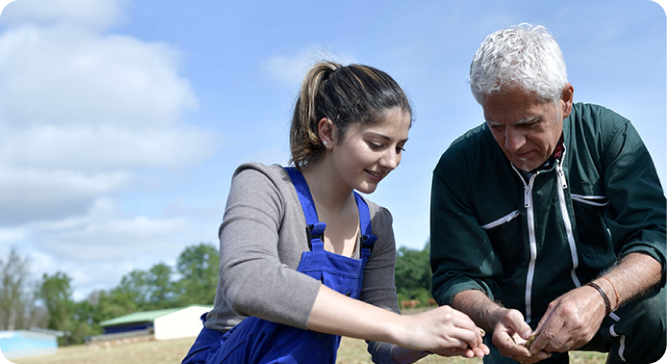Our role as a Jobs and Skills Council is to work with stakeholders to identify, forecast and respond to current and emerging skills needs and workforce challenges.
Work has commenced on three new projects to address skills and workforce needs across the industries we support. The Workforce Plan outlines numerous projects across the industries we work with. These three are the first to be approved by the Department of Employment and Workplace Relations (DEWR). Further projects will commence following DEWR approval of an Annual Activity Plan.
Your input into these projects is crucial so that we can identify and implement solutions that benefit employers, trainers, learners and businesses.
Attracting new entrants by improving the visibility and attractiveness of career pathways is a key focus for Australia’s agriculture industry.
An agricultural trade pathway is one potential solution recommended by the Agricultural Workforce Working Group, the National Agricultural Labour Advisory Committee in the National Agriculture Workforce Strategy, and the National Farmers’ Federation in their 2030 Roadmap.
This project will explore the feasibility and viability of establishing an agricultural trade apprenticeship pathway. Initial research will be undertaken in collaboration with industry stakeholders, training providers, government bodies, and other relevant parties.
For more information, visit the project page
As the Agriculture, Horticulture, Conservation and Land Management (AHC) Training Package is so complex and supports so many related professions, it’s important it can be updated in an efficient manner.
Over the past few years, strategic revisions to the training package have been completed by unit sector, rather than by qualification.
As a result, several qualifications and skill sets need to be updated to incorporate units of competency that have been developed or revised in recent projects, including several work health and safety and environmental care related units.
We are seeking feedback from trainers and industry with an interest in the qualifications that require updating, so that all relevant information has been considered before updates are made.
For more information, visit the project page
Manual tree felling skills are essential for removing trees in locations or positions that make the use of large machinery unviable. These skills are described in three units of competency at a basic, intermediate and advanced level, which specifically outline the number of trees required to be felled to demonstrate competence.
It is important that the number outlined by these units is not so high that it creates a barrier for training providers to offer training. At the same time, manual tree felling is a technical skill requiring supervised practice in order to be done safely.
Consultation will take place throughout this project to review the three tree felling units and consider how many trees are required to demonstrate each skill level and what other mechanisms may be needed to support safety, accessibility, and competency.
For more information, visit the project page


